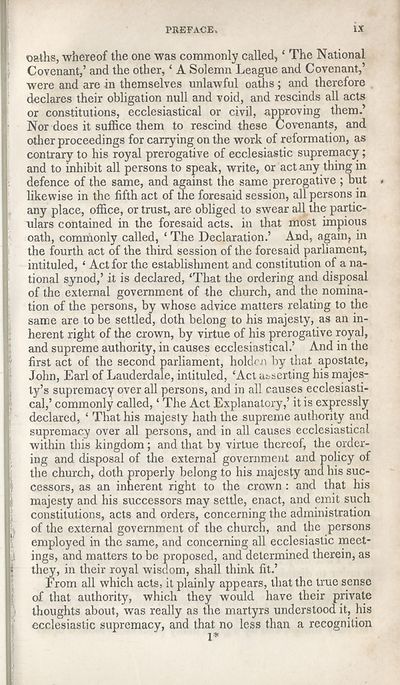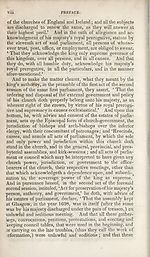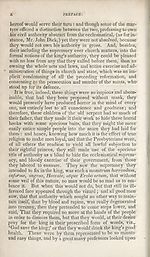Religion & morality > Cloud of witnesses, for the royal prerogatives of Jesus Christ, or, The last speeches and testimonies of those who suffered for the truth in Scotland, in the years 1681-1688, with an appendix, containing the Queensferry paper, Torwood excommunications, &c
(29)
Download files
Complete book:
Individual page:
Thumbnail gallery: Grid view | List view

PREFACE.
IX
oaths, whereof the one was commonly called, ‘ The National
Covenant,’ and the other, ‘ A Solemn League and Covenant,’
were and are in themselves unlawful oaths; and therefore
declares their obligation null and void, and rescinds all acts
or constitutions, ecclesiastical or civil, approving them.’
Nor does it suffice them to rescind these Covenants, and
other proceedings for carrying on the work of reformation, as
contrary to his royal prerogative of ecclesiastic supremacy;
and to inhibit all persons to speak, write, or act any thing in
defence of the same, and against the same prerogative ; but
likewise in the fifth act of the foresaid session, all persons in
any place, office, or trust, are obliged to swear all the partic¬
ulars contained in the foresaid acts, in that most impious
oath, commonly called, ‘ The Declaration.’ And, again, in
the fourth act of the third session of the foresaid parliament,
intituled, 4 Act for the establishment and constitution of a na¬
tional synod,’ it is declared, ‘That the ordering and disposal
of the external government of the church, and the nomina¬
tion of the persons, by whose advice matters relating to the
same are to be settled, doth belong to his majesty, as an in¬
herent right of the crown, by virtue of his prerogative royal,
and supreme authority, in causes ecclesiastical.’ And in the
first act of the second parliament, holdcn by that apostate,
John, Earl of Lauderdale, intituled, ‘Act averting his majes¬
ty’s supremacy over all persons, and in all causes ecclesiasti¬
cal,’ commonly called, ‘ The Act Explanatory,’ it is expressly
declared, ‘ That his majesty hath the supreme authority and
supremacy over all persons, and in all causes ecclesiastical
within this kingdom ; and that by virtue thereof, the order¬
ing and disposal of the external government and policy of
the church, doth properly belong to his majesty and his suc¬
cessors, as an inherent right to the crown : and that his
majesty and his successors may settle, enact, and emit such
constitutions, acts and orders, concerning the administration
of the external government of the church, and the persons
employed in the same, and concerning all ecclesiastic meet¬
ings, and matters to be proposed, and determined therein, as
they, in their royal wisdom, shall think fit.’
From all which acts, it plainly appears, that the true sense
of that authority, which they would have their private
thoughts about, was really as the martyrs understood it, his
ecclesiastic supremacy, and that no less than a recognition
IX
oaths, whereof the one was commonly called, ‘ The National
Covenant,’ and the other, ‘ A Solemn League and Covenant,’
were and are in themselves unlawful oaths; and therefore
declares their obligation null and void, and rescinds all acts
or constitutions, ecclesiastical or civil, approving them.’
Nor does it suffice them to rescind these Covenants, and
other proceedings for carrying on the work of reformation, as
contrary to his royal prerogative of ecclesiastic supremacy;
and to inhibit all persons to speak, write, or act any thing in
defence of the same, and against the same prerogative ; but
likewise in the fifth act of the foresaid session, all persons in
any place, office, or trust, are obliged to swear all the partic¬
ulars contained in the foresaid acts, in that most impious
oath, commonly called, ‘ The Declaration.’ And, again, in
the fourth act of the third session of the foresaid parliament,
intituled, 4 Act for the establishment and constitution of a na¬
tional synod,’ it is declared, ‘That the ordering and disposal
of the external government of the church, and the nomina¬
tion of the persons, by whose advice matters relating to the
same are to be settled, doth belong to his majesty, as an in¬
herent right of the crown, by virtue of his prerogative royal,
and supreme authority, in causes ecclesiastical.’ And in the
first act of the second parliament, holdcn by that apostate,
John, Earl of Lauderdale, intituled, ‘Act averting his majes¬
ty’s supremacy over all persons, and in all causes ecclesiasti¬
cal,’ commonly called, ‘ The Act Explanatory,’ it is expressly
declared, ‘ That his majesty hath the supreme authority and
supremacy over all persons, and in all causes ecclesiastical
within this kingdom ; and that by virtue thereof, the order¬
ing and disposal of the external government and policy of
the church, doth properly belong to his majesty and his suc¬
cessors, as an inherent right to the crown : and that his
majesty and his successors may settle, enact, and emit such
constitutions, acts and orders, concerning the administration
of the external government of the church, and the persons
employed in the same, and concerning all ecclesiastic meet¬
ings, and matters to be proposed, and determined therein, as
they, in their royal wisdom, shall think fit.’
From all which acts, it plainly appears, that the true sense
of that authority, which they would have their private
thoughts about, was really as the martyrs understood it, his
ecclesiastic supremacy, and that no less than a recognition
Set display mode to:
![]() Universal Viewer |
Universal Viewer | ![]() Mirador |
Large image | Transcription
Mirador |
Large image | Transcription
| Permanent URL | https://digital.nls.uk/132215987 |
|---|
| Description | Thousands of printed books from the Antiquarian Books of Scotland collection which dates from 1641 to the 1980s. The collection consists of 14,800 books which were published in Scotland or have a Scottish connection, e.g. through the author, printer or owner. Subjects covered include sport, education, diseases, adventure, occupations, Jacobites, politics and religion. Among the 29 languages represented are English, Gaelic, Italian, French, Russian and Swedish. |
|---|

